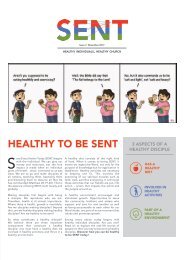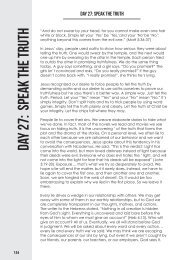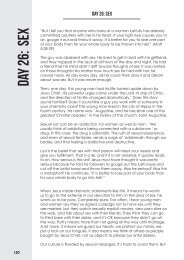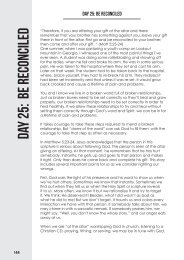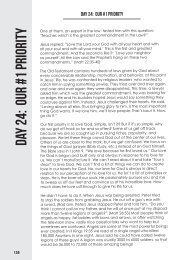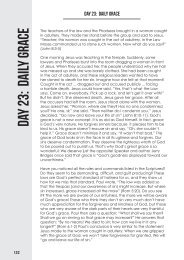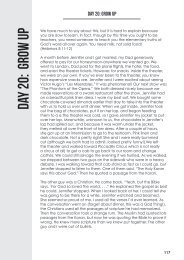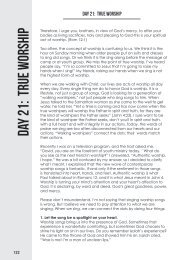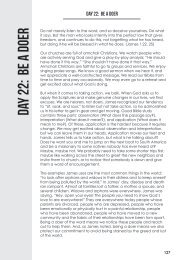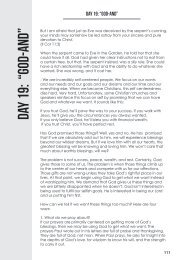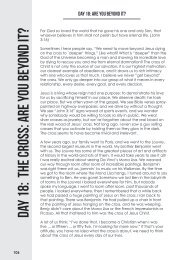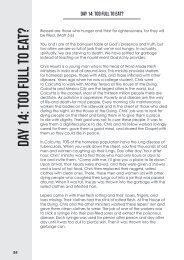You also want an ePaper? Increase the reach of your titles
YUMPU automatically turns print PDFs into web optimized ePapers that Google loves.
Acknowledgments<br />
Living Logos was the heart-work of Bro<br />
Dale Starks and Sis Josephine Starks,<br />
missionaries to Singapore in the early<br />
1980s. As the original authors of this<br />
devotionals, the Starks meant for<br />
these self-study materials to help new converts<br />
(and matured saints alike) get a hold of an<br />
understanding of God’s written Word. Since Sis<br />
Stark’s passing in 2013, the couple had graciously<br />
entrusted Tabernacle of Joy with its copyright.<br />
Therefore, with every print run, we would like to<br />
honour their life work and sacrifice in bringing the<br />
gospel to Singapore. This copy is an updated and<br />
revised version. Be blessed as you immerse yourself<br />
in the Word and allow God to transform you into<br />
the likeness of Jesus Christ.<br />
1
<strong>Lesson</strong><br />
Six<br />
<strong>Old</strong> <strong>Testament</strong> 2<br />
<strong>Old</strong> <strong>Testament</strong> 2<br />
DAVID BECOMES KING!<br />
In the beginning, when the Philistines rose up to fight against<br />
Israel, David and his men joined forces with the Philistines.<br />
Achish knew that Saul hated David, so he was not concerned<br />
that David might turn against him. Such faith did he have in<br />
David that he made him his personal bodyguard, “the keeper<br />
of mine head” (I Samuel 28:2). However, the princes of the<br />
Philistines had a genuine fear that David and his men would<br />
turn against them, in an effort to gain reconciliation with Saul.<br />
Achish finally hearkened unto these men, and sent David back<br />
to Ziklag (I Samuel, Chapter 29).<br />
David was not prepared for what he saw when he returned!<br />
The Amalekites had invaded the south, including Ziklag, and<br />
took advantage of the absence of David and his men. They<br />
burned the city with fire, and took all the women and children<br />
as captives. David and his men lifted up their voices and wept<br />
until they could weep no more. David’s two wives were among<br />
those who had been taken captive. Added to all of this, the<br />
men blamed David, and began to talk about stoning him (I<br />
Samuel 30:1-5).<br />
...But David encouraged himself in the LORD his God<br />
— I Samuel 30:6<br />
David’s wives were not there to give him words of comfort.<br />
Jonathan was at his father’s side, warring against the<br />
Philistines. How lonely David felt! And then the shepherd boy<br />
remembered his God. The same God that helped him kill the<br />
lion and the bear, the same God that helped him kill Goliath,<br />
and the same God that had given him many victories over<br />
the Philistines would help him again. Perhaps David starting<br />
singing one of his psalms:<br />
Yea, though I walk through the valley of the shadow of death, I<br />
will fear no evil: for thou art with me<br />
— PSalm 23:4<br />
48
Discouragement is one of the devil’s chief weapons. If he can get a Christian<br />
to feel sorry for himself - defeated, dejected, and ready to throw up his<br />
hands and quit - then the battle is more than half won for him.<br />
There are times when there are others around us to encourage us. But there<br />
are also times when we must learn to encourage ourselves in the Lord. At<br />
such times, we should think about all of God’s goodness and kindness<br />
towards us, and the victories He has given us in the past, even in the dark<br />
valleys that we are sometimes forced to walk through.<br />
After David encouraged himself in the LORD, he was ready and willing to<br />
fight again, if it was God’s will. God assured him that it was, and that he<br />
would recover everything that had been taken. David and his six hundred<br />
men pursued after the Amalekites until they came to the brook Besor. Here,<br />
they left two hundred men who were so weak that they could go no further.<br />
At the same place they found an Egyptian who was about to perish from<br />
starvation. He had eaten no food nor drunk any water for three days and<br />
nights. David fed the man until he revived, and then began to question him.<br />
David found out that he was a servant to an Amalekite who had been one<br />
of those who had invaded Ziklag. After making David promise to spare his<br />
life, he led them to the Amalekites, who were right in the middle of a big<br />
victory celebration (I Samuel 30:8-16)<br />
And David smote them from the twilight even unto the evening of the next day:<br />
and there escaped not a man of them, save four hundred young men, which rode<br />
upon camels, and fled.<br />
And David recovered all that the Amalekites had carried away: and David<br />
rescued his two wives.<br />
And there was nothing lacking to them, neither small nor great, neither sons<br />
nor daughters, neither spoil, nor any thing that they had taken to them: David<br />
recovered all<br />
— I Samuel 30:17-19<br />
They also took of the wealth that had belonged to the Amalekites, and<br />
after David and his men returned to Ziklag, David sent it as presents to his<br />
friends in various places where he and his men had lived since his exile (I<br />
Samuel 30:26-31).<br />
Meanwhile, the Philistines were fighting against Israel, and Israel was<br />
suffering a grave defeat at Mount Gilboa. Among those who were slain were<br />
Jonathan and his two brothers, Abinadab and Malchishua. Finally, Saul<br />
49
himself was wounded by an arrow. He commanded his armour-bearer to<br />
finish killing him, “lest these uncircumcised come and thrust me through,<br />
and abuse me.” However, the armour-bearer was afraid to do so. Then, Saul<br />
fell upon his own sword, and died. The armour-bearer, seeing his master was<br />
dead, did likewise (I Samuel 31:1-6).<br />
When the Philistines came and found Saul dead, they cut off his head,<br />
and stripped off his armour, and sent them to be exhibited in the land of<br />
the Philistines. His armour was put in the house of Ashtaroth (a goddess),<br />
and his body was fastened to the wall of Beth-shan, a city of Mannaseh that<br />
Israel had never been able to conquer and possess.<br />
When the inhabitants of Jabesh-gilead heard of that which the Philistines<br />
had done, the valiant men among them rose up and stole the bodies of Saul<br />
and his sons from off the wall of the city, and came to Jabesh, and burnt<br />
them there. Then they buried their bones under a tree at Jabesh, and fasted<br />
for seven days as an act of mourning (I Samuel 31:8-13).<br />
DAVID HEARS OF THE DEATH OF SAUL AND<br />
JONATHAN<br />
On the third day after David and his men had returned to Ziklag, a man<br />
came out of the camp from Saul with his clothes rent (torn to show grief),<br />
and earth upon his head. He fell down to the earth before David. He told<br />
David that he had escaped from the battle. David asked how the battle went,<br />
and the man replied that Saul and Jonathan were dead.<br />
When David was convinced that the man was telling the truth, he tore his<br />
clothes, and all the others around him did likewise. They mourned and<br />
wept until evening for Saul, and for Jonathan his son, and for the people of<br />
the LORD that were killed in the battle (II Samuel 1:1-12).<br />
The following is the lamentation that David lamented over the death of<br />
Saul and Jonathan:<br />
The beauty of Israel is slain upon thy high places: how are the mighty fallen!<br />
Tell it not in Gath, publish it not in the streets of Askelon; lest the daughters of<br />
the Philistines rejoice, lest the daughters of the uncircumcised triumph.<br />
Ye mountains of Gilboa, let there be no dew, neither let there be rain, upon you,<br />
nor fields of offerings: for there the shield of the mighty is vilely cast away, the<br />
shield of Saul, as though he had not been anointed with oil.<br />
50
From the blood of the slain, from the fat of the mighty, the bow of Jonathan<br />
turned not back, and the sword of Saul returned not empty.<br />
Saul and Jonathan were lovely and pleasant in their lives, and in their death they<br />
were not divided: they were swifter than eagles, they were stronger than lions.<br />
Ye daughters of Israel, weep over Saul, who clothed you in scarlet, with other<br />
delights, who put on ornaments of gold upon your apparel.<br />
How are the mighty fallen in the midst of the battle! O Jonathan, thou wast<br />
slain in thine high places. I am distressed for thee, my brother Jonathan: very<br />
pleasant hast thou been unto me: thy love to me was wonderful, passing the love<br />
of women.<br />
How are the mighty fallen, and the weapons of war perished!<br />
— II Samuel 1:19-27<br />
DAVID IS MADE KING<br />
After lamenting for Saul and Jonathan, David took his family, and all the<br />
men that were with him, and they dwelt in the cities of Hebron in Judah.<br />
The men of Judah came, and there anointed David to be king over the<br />
house of Judah. They also told David how the men of Jabesh-gilead had<br />
buried the bones of Saul and his sons. David sent a message unto these<br />
men, thanking them for their kindness, and promising that they would<br />
be rewarded for this act. He also told them that the men of Judah had<br />
anointed him king in the stead of Saul.<br />
Abner, Saul’s captain, was not ready to submit unto David. He took Ishbosheth,<br />
another one of Saul’s sons, and made him king over all of Israel<br />
- except the tribe of Judah (II Samuel 2:1-11).<br />
One day, Abner and the servants of Ishbosheth came to Gibeon. Joab, the<br />
son of David’s half-sister Zeruiah, and other of David’s servants also came<br />
to Gibeon. Each group sat on one side of a pool, opposite each other. After<br />
awhile, Joab suggested that they have a contest between twelve of his men,<br />
and twelve of David’s men. Abner agreed. All twelve men were armed with<br />
their swords. “And they caught every one his fellow by the head, and thrust<br />
his sword in his fellow’s side: so they fell down together” (II Samuel 2:16). In<br />
other words, all twenty-four men died!<br />
This resulted in a battle between David’s servants, and those under Abner’s<br />
command. Abner and his men were severely beaten, and Abner began to<br />
51
flee. Joab’s brother, Asahel, pursued after Abner. He was “as light of foot as<br />
a wild roe.” Abner warned him several times to turn back, but he refused.<br />
Abner did not want to kill him, because he was Joab’s brother. But when<br />
Asahel, who had no armour, continued to pursue Abner, Abner smote him<br />
with his spear, so that he died. Nevertheless, at the end of the day, 379 men<br />
had died, but only nineteen of them were David’s servants (II Samuel 2:17-<br />
31).<br />
A civil war continued between the house of Saul and the house of David for<br />
quite some time, but “David waxed stronger and stronger, and the house of<br />
Saul waxed weaker and weaker” (II Samuel 3:1).<br />
Meanwhile, Abner had a quarrel with his king. Ishbosheth accused him<br />
of going in unto one of Saul’s concubines. This so angered Abner that he<br />
vowed he would help bring all Israel under David’s dominion. The king<br />
could not answer, because he feared Abner.<br />
Then Abner sent messengers to David on his behalf, saying:<br />
...Whose is the land?...Make thy league with me, and, behold, my hand shall be<br />
with thee, to bring about all Israel unto thee<br />
— II Samuel 3:12<br />
David promised that he would make a league with Abner on the condition<br />
that he would not see Abner’s face unless he brought Michal, Saul’s<br />
daughter, with him. After David had fled from Saul’s house, Saul had given<br />
her to another man. Michal was taken away from her husband, despite the<br />
man’s weeping protests. In fact, he followed her until he was told to return<br />
home.<br />
Then Abner spoke to the elders of Israel:<br />
...ye sought for David in times past to be king over you: Now then do it: for the<br />
LORD hath spoken of David, saying, By the hand of my servant David I will save<br />
my people Israel out of the hand of the Philistines, and out of the hand of all<br />
their enemies<br />
— II Samuel 3:17-18<br />
He then spoke to the men of Benjamin the same thing. Then he came to<br />
Hebron with his men to confer with David, and to tell him that the elders<br />
of Israel and the men of Benjamin were ready to submit to his leadership.<br />
David made a feast for Abner and his men, and sent Abner away in peace.<br />
52
Joab was not there when all of this took place, because he and his men<br />
had fought and won a battle. When he came in from the battle and found<br />
out that Abner had been there and made a league with David, he was very<br />
angry. Although Abner had killed Asahel in self-defence, Joab was ready to<br />
take revenge upon him for killing his brother. Joab sent messengers after<br />
Abner to bring him secretly to the gate of Hebron. Then he took him aside<br />
in the gate to speak with him quietly, and smote him under the fifth rib, so<br />
that he died (II Samuel 3:19-27).<br />
When David heard about it, he refused to take any of the blame. He said:<br />
...I and my kingdom are guiltless before the LORD for ever from the blood of<br />
Abner the son of Ner: Let it rest on the head of Joab, and on all his father’s<br />
house; and let there not fall from the house of Joab one that hath an issue, or<br />
that is a leper, or that leaneth on a staff, or that falleth on the sword, or that<br />
lacketh bread<br />
— II Samuel 3:28-29<br />
Then David commanded Joab and all the people to tear their clothes, put<br />
on sackcloth, and mourn before Abner. King David himself followed the<br />
casket to the burial, and wept at the grave, saying:<br />
...Died Abner as a fool dieth? Thy hands were not bound, nor thy feet put into<br />
fetters: as a man falleth before wicked men, so fellest thou...<br />
— II Samuel 3:33-34<br />
David refused to eat the rest of the day until the sun went down. The<br />
people all understood that David had no plans to slay Abner. David told his<br />
servants, “Know ye not that there is a prince and a great man fallen this day<br />
in Israel? And I am this day weak, though anointed king...” (II Samuel 3:<br />
38-39).<br />
When Ishbosheth, Saul’s son, heard that Abner was dead, he felt helpless<br />
and weak. Abner had been the captain of his armies, and had helped set<br />
him up as king of Israel. In fact, “all the Israelites were troubled” (I Samuel<br />
4:1).<br />
Two brothers, Baanah and Rechab, who were Benjamites, were convinced<br />
that David would soon reign over all Israel, so they decided to do something<br />
to win David’s approval. They were captains of raiding bands, and had<br />
access to the king’s house. They came in the heat of the day when the king<br />
was resting, pretending they had come to fetch wheat. Instead, they killed<br />
Ishbosheth, cut off his head, and travelling all night, brought it to David,<br />
expecting his praise.<br />
53
And David answered...As the LORD liveth, who hath redeemed my soul out of<br />
all adversity, When one told me, saying, Behold, Saul is dead, thinking to have<br />
brought good tidings, I took hold of him, and slew him in Ziklag, who thought<br />
that I would have given him a reward for his tidings:<br />
How much more, when wicked men have slain a righteous person in his own<br />
house upon his bed? shall I not therefore now require his blood of your hand,<br />
and take you away from the earth?<br />
— II Samuel 4:9-11<br />
Then David commanded his young men to slay them, and their hands and<br />
feet were cut off and hung up over the pool of Hebron. The head of Saul’s<br />
son, Ishbosheth, was buried in the sepulchre of Abner in Hebron (II Samuel<br />
4:12). Then, all the tribes of Israel came to Hebron and spoke to David:<br />
...Behold, we are thy bone and thy flesh. Also in time past, when Saul was king<br />
over us, thou wast he that leddest out and broughtest in Israel: and the LORD<br />
said to thee, Thou shalt feed my people Israel, and thou shalt be a captain over<br />
Israel<br />
— II Samuel 5:1-2<br />
Then all the elders of Israel came to the king to Hebron, and David made a<br />
league with them before the Lord. David was anointed king over all Israel.<br />
He was thirty years old when he began to reign, a reign that lasted for forty<br />
years. He reigned over Judah seven years and six months, and in Jerusalem<br />
he reigned over all Israel thirty-three years (II Samuel 5:3-5).<br />
VOCABULARY<br />
adversary —<br />
enemy<br />
competitor —<br />
league —<br />
reconciliation —<br />
sepulchre —<br />
a person who competes or contends with another<br />
an agreement made by nations or people<br />
the act of being brought together again<br />
a vault or chamber for burial, a tomb<br />
54
<strong>Old</strong><br />
<strong>Lesson</strong><br />
<strong>Testament</strong><br />
Six<br />
2<br />
Test<br />
1<br />
2<br />
3<br />
4<br />
5<br />
6<br />
7<br />
8<br />
9<br />
10<br />
11<br />
12<br />
What position did Achish give David?<br />
_________________________________________________________.<br />
What fear did the princes of the Philistines have?<br />
__________________________________________________________<br />
_________________________________________________________.<br />
When David returned to the city of Ziklag, what did he find?<br />
__________________________________________________________<br />
_________________________________________________________.<br />
Who encouraged David at that time? ____________________________.<br />
We must learn to _______________________________ ourselves in the<br />
_____________________________________.<br />
How much of David and his men’s family and goods were recovered from<br />
the Amalekites?<br />
_________________________________________________________.<br />
Who was killed in Israel’s battle against the Philistines at Mount Gilboa?<br />
_________________________________________________________.<br />
How did Saul die?<br />
__________________________________________________________<br />
_________________________________________________________.<br />
Was David happy about his death? Explain.<br />
__________________________________________________________<br />
_________________________________________________________.<br />
In David’s lamentation, how did he express his love for Jonathan?<br />
__________________________________________________________<br />
_________________________________________________________.<br />
David was first anointed king only over the house (tribe) of<br />
_________________________________________________________.<br />
Who was not yet willing to submit unto David?<br />
_________________________________________________________.<br />
55
13<br />
14<br />
15<br />
16<br />
17<br />
18<br />
19<br />
20<br />
Who did he take and make king over the rest of Israel?<br />
_________________________________________________________.<br />
What kind of a contest did Abner and his men have with Joab and his<br />
men?<br />
__________________________________________________________<br />
_________________________________________________________.<br />
What was the result of the contest?<br />
_________________________________________________________.<br />
What quarrel did Abner have with his king (Ishbosheth)?<br />
__________________________________________________________<br />
_________________________________________________________.<br />
What promise did Abner give to David, if he would make a league with<br />
him?<br />
__________________________________________________________<br />
_________________________________________________________.<br />
Was Joab happy about the league? What did he do to Abner?<br />
__________________________________________________________<br />
_________________________________________________________.<br />
How old was David when he began to reign over all Israel?<br />
_________________________________________________________.<br />
What was of special interest to you in this lesson?<br />
56
205 Henderson Road, #07-01<br />
Henderson Industrial Park, S159549<br />
Tel: 63344022 Email: contactus@tabjoy.org<br />
Website: www.tabjoy.org




